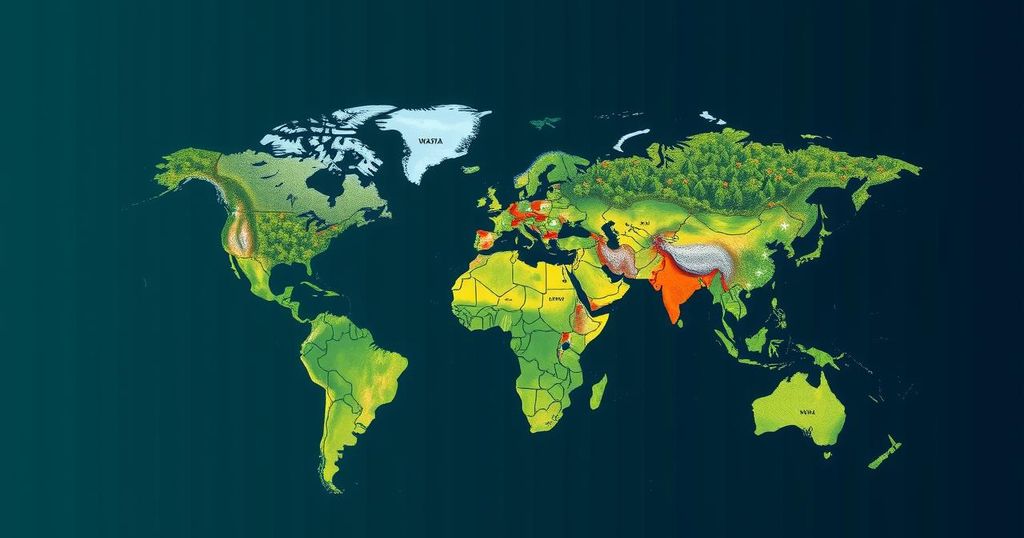Pro-Kremlin Media’s Climate Narrative: Strategy or Genuine Concern?

As COP 29 approaches, pro-Kremlin media outlets simultaneously acknowledge climate change while weaponizing the discourse to challenge Western policies. These narratives target various audiences and utilize skepticism and satire to undermine EU credibility, portraying environmental initiatives as tools for political manipulation rather than genuine efforts against climate change.
As the United Nations Climate Change Conference (COP 29) approaches, Russian state-controlled and pro-Kremlin media outlets are increasingly acknowledging climate change, yet they are simultaneously employing this acknowledgment as a strategy to undermine Western policies. These outlets leverage climate discussions to promote narratives that cast doubt on the effectiveness and sincerity of Western governmental efforts, particularly those of the European Union (EU). The narrative has evolved such that rather than outright denial, these outlets position climate change as a tool for propaganda against Western countries, alleging hypocrisy and questioning the validity of renewable energy solutions. Over the past year, this manipulation of the climate narrative has become more pronounced, targeting various audiences with tailored messaging. For instance, Russian media targeting Spanish-speaking populations in Latin America and the United States leverage both left-leaning and right-leaning frames, showcasing their adaptability in messaging. Reports have cited measures from Europe, such as Denmark’s taxation of greenhouse gas emissions from livestock, albeit often with a mocking tone directed towards EU leadership and their environmental policies. Some fringe outlets even suggest that climate change may offer economic benefits to Russia, painting a picture that contrasts sharply with established scientific consensus. Despite the presence of climate change denial within certain marginal publications, the overarching strategy seems to be focused on promoting narratives that portray Western governments as manipulative or incompetent. For instance, critics in English-language editions of Russian media assert that Western officials are perpetuating alarmist views without substantiated evidence. This skepticism is not aimed at fostering a fact-based discussion; rather, it serves as a vehicle for vilifying the EU and its representatives, whom they label as extremists or ideologically driven. One specific example includes the ridicule of environmental measures, where commentators publicly mock the policies of Western leaders on social media platforms, reinforcing their narratives among supporters. Pro-Kremlin discourse often invokes fantasies of a global elite controlling climate initiatives to enact authoritarian governance, reflecting a conspiratorial mindset. In this way, climate change discussions are repurposed to critique and delegitimize the motives and actions of Western politicians. These narratives further extend into bizarre conspiracy theories claiming that influential American families like the Rockefellers orchestrated the climate change phenomenon. This level of sensationalism is indicative of a broader strategy to demonize the idea of climate activism by suggesting that it is a guise for nefarious goals. Observations such as these elucidate how climate skepticism is co-opted to distract from genuine discussions surrounding environmental issues, capitalizing instead on doubts and fears among audiences. Evidently, the choice between acknowledging climate change and promoting public doubt creates a complex battleground for information warfare. While more mainstream Russian outlets may superficially concede to the climate change consensus, their underlying agendas reveal a calculated preference for using environmental discourse as a weapon against perceived Western hypocrisy and ineffectiveness. In doing so, Russian state-controlled media reflect a flexible disinformation strategy that prioritizes opportunism over factual discourse.
The article addresses the tactics employed by Russian media in the context of the upcoming UN Climate Change Conference (COP 29) while examining the strategic manner in which they handle climate change narratives. Initially, the piece discusses how Kremlin-affiliated outlets have shifted from outright denial of climate change to a more nuanced approach, which includes acknowledging it yet using this acknowledgment to criticize Western governments and policies. The manipulation of climate discourse allows these media outlets to foster divisions and mistrust towards Western alliances, particularly within the EU, thereby serving their geopolitical objectives. The framework outlines how these narratives are tailored to reach various demographics, exploiting domestic and international audiences’ sentiments toward environmental issues.
In summary, pro-Kremlin media outlets have adapted their climate change narratives to both acknowledge the phenomenon and use it as a political weapon against Western countries. By framing climate discussions within a context of skepticism and ridicule towards Western policies, these outlets seek to undermine the credibility of the EU and its environmental initiatives. The strategic manipulation of climate information demonstrates a broader pattern of disinformation that exploits public fears and doubts, reinforcing existing divisions and promoting an agenda aimed at discrediting Western governments under the guise of environmental critique.
Original Source: euvsdisinfo.eu






